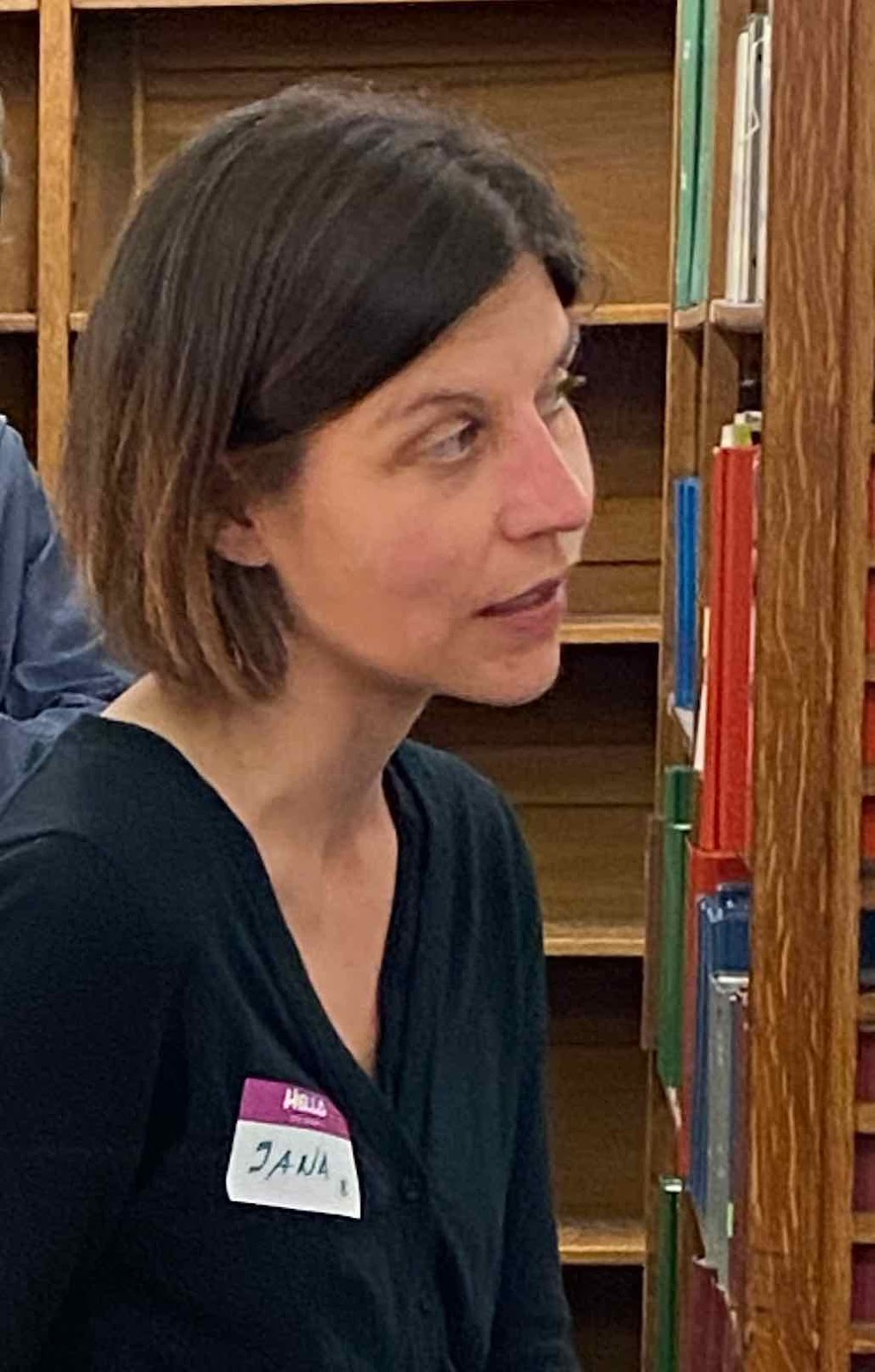This week I went to the Summer Social at the Hannah Arendt Center on the campus of Bard College. The campus is set in rolling wooded hills on the east bank of the Hudson River between Albany and New York City. I arrived just after a short downpour so the weather was cool and cloudy. Tables had been set up for dinner outside, but the wet tables meant the event was indoors.
As soon as I entered the large old dwelling that houses the HAC I was greeted by Christine Gonzalez Stanton, Executive Director of the HAC and the kind of enthusiastic person every organization would love to have in charge of operations. She signed me up for the book raffle and pointed me toward the appetizers and drinks in the kitchen.
As soon as I entered the kitchen I met Ken Landauer in person. We had been in one of the smaller Zoom groups discussing Hannah Arendt's lectures on Kant. Ken makes zero-waste furniture in a nearby town. The website of his company FN Furniture lists Ken as "Chairperson" of the business noted for making things to sit on. In person he is even more dryly funny as he is on Zoom.
I have been a member of the HAC for several years and attended three annual conferences in person. Since 2018, I have joined weekly meetings of the Virtual Reading Group of the HAC. As many as 200 people participate in these 90-minute calls on Friday afternoons year-round with seasonal breaks. At the the Summer Social and the Annual Conference I have met many people who were only faces on Zoom.
The VRG format is a 20-30 minute introduction of the reading followed by a discussion. The discussion leader is the Founder and Academic Director of the HAC Roger Berkowitz. I sometimes stay on line for the discussions, but I always listen to Roger's introductions of the reading. Here is a short clip of Roger welcoming us to the social:
After the introduction, we walked through the woods up a small hill to the Bard College Cemetery. Hannah Arendt and her husband Heinrich Blucher are buried there and have small markers next to each other.
We all placed stones on Arendt's grave. As with so many things in Arendt's life and work, her death was controversial. She wanted to be cremated, not a usual practice in 1975 for Jews. Her wishes were carried despite resistance from a relative. Her ashes are interred in the Bard Cemetery.
------
After the walk to the cemetery, we went to the library. Arendt's personal library is in a special collection in the Bard Library. Four scholars connected to the Bard and the HAC made short presentations about their work.
First was Jana Mader, Lecturer in the Humanities at Bard. She will present at the HAC fall conference on the friendship between Arendt and the poet W.H. Auden. Arendt credits Auden with teaching her English and helping to edit the works she wrote in English. The poet Robert Lowell was also a friend of Arendt. Mader put books with inscriptions to greetings to her by the poets on display.
Born in Germany, Mader teaches literature at Bard and is a writer and artist. She just had a book published that made me wish (again) that I could read German fluently. Her book Natur und Nation cooperatively analyzes 19th century literature inspired by the Hudson River with texts inspired by the Rhine River. In October her curated walks to women's history in New York City will be published, this one in English.
------
Next Nicholas Dunn spoke about Hannah Arendt's lectures and writing about Emmauel Kant. He talked about a conference he is hosting on June 20 with the author of the book Hannah Arendt's Lectures on Kant's Political Philosophy, Ronald Beiner.Dunn talked about the way unique Arendt looked at Kant's thought and some of the response to her views. Dunn is the Klemens von Klemperer Postdoctoral Fellow at the Hannah Arendt Center for Politics and Humanities at Bard College. He will also teach courses in the Departments of Philosophy and Political Studies and for the Bard Prison Initiative.
-------
Jana Bacevic is a visiting scholar at the HAC. She led a conference at the HAC earlier this month on the Social Life of the Mind. She explained Arendt's reading of and view of the The New Class: An Analysis of the Communist System by Milovan Dilas, a Yugoslav intellectual. As with the Kant volume, Arendt had a unique perspective on Dilas and his work. Dilas was jailed when the book was published in 1958 because he sent it to western countries for review. Foreign Affairs magazine published a one-paragraph review of the book in 1958 that said:
The manuscript of this book was sent abroad for publication and the author is now in prison as a consequence. It is important both for the quality of its thought and for the fact that it is a root-and-branch criticism of Communism, including Titoism, from within the Party itself. Since he was formerly one of the ranking Party leaders in Jugoslavia, his picture of the Communist monopoly of power is particularly telling, and the indictment is made with a typically Montenegrin lack of restraint.
------
Thomas Bartscherer, the Peter Sourian Senior Lecturer in Humanities, was the final speaker. He announced that his volume in the series Hannah Arendt--Complete Works. Critical Edition will be published this year. He was so happy about the firm publication date that he had the audience chant a call and response of
"When?"
"This year!"
He told us each volume of the critical edition includes images of works in Arendt's library that she used for reference in her works. Underlines, notes, starred items, are all included in the published book along with the text itself. His volume is on Arendt's The Life of the Mind, her last and uncompleted work. She died on the week she was to begin the third volume on judgement.
Bartscherer talked about some of the complexities of finding and compiling annotations. Arendt had five copies of Aristotles Nichomachean Ethics: two in Greek, two in English, one in German. She made notes and underlined passages in all of them, on different passages in each book.
-------
After the library we went back to the HAC building and ate dinner together, a buffet meal set up in the kitchen. During the dinner I met more people who read and admire Hannah Arendt. I am very much looking forward to returning for the conference on Friendship and Politics in the fall and possibly the event on Kants lectures next month.















No comments:
Post a Comment